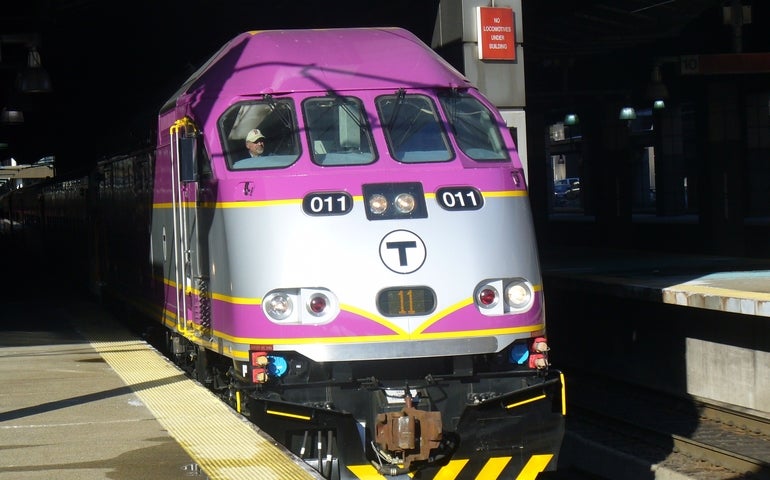Buses, ferries, commuter rail eyed for service cuts
 Photo | Courtesy of MassDOT
An MBTA commuter rail train
Photo | Courtesy of MassDOT
An MBTA commuter rail train
Lower-ridership bus routes, most commuter rail lines and some ferries appear most likely to receive service cuts at the MBTA starting next year, but even the core subway system may need to run trains less frequently to help close the agency's massive budget gap, officials said Monday.
MBTA officials have recommended slicing $60 million to $255 million from spending on services in fiscal 2021 and 2022 to help manage a COVID-inflicted budget shortfall, targeting routes with low ridership potential and a smaller portion of "transit-critical" riders for the steepest cuts.
As the agency inches toward deciding where and how to trim, T staff on Monday gave the clearest indication yet of the potential ground-level impacts the crisis will carry.
Possible "levers" the T can pull to save money while minimizing impacts on the most important routes, they said, include eliminating weekend service on some or all commuter rail lines, halting commuter rail trains after 9 p.m. on weekdays, eliminating ferries, consolidating bus routes and trimming bus or train frequency.
Those ideas are still preliminary, and no cuts -- nor a final answer on which routes will be most affected -- have been confirmed.
T staff plan to present options for comprehensive, line-by-line changes on Nov. 2, then open a month-long public feedback period before the Fiscal and Management Control Board reaches a final decision on Dec. 7.
"Some of these decisions we are making will require a significant amount of time to put into operation, to put into flight, so that we can realize some of the savings in next year's budget," MBTA General Manager Steve Poftak said during a Monday board meeting. "I think it's important that we do this with a pretty deliberate tempo so we hit our Dec. 7 date to make many of these -- what I fully acknowledge are really difficult decisions."
In a presentation on Monday, MBTA Director of Strategic Research Anna Gartsman said most of the subway system -- except for the Green Line's B, C, D and E branches -- is essential service because it has high potential for ridership to recover from pandemic-era lows and a large number of transit-dependent riders.
Most bus routes, representing about 65 percent of bus service hours, are also rated essential, with the remainder deemed less important because of lower ridership potential, less dependent commuters, or both.
The Fairmount Line, which runs through Boston neighborhoods with significant low-income populations who have little access to other transit, and the Charlestown ferry were the only routes from their services in the essential category.
All other lines and routes are more likely to be scaled back or cut entirely when the still-in-development service changes take effect in July.
Cost-saving options floated at Monday's meeting included eliminating or reducing frequency on the Hingham and Hull ferries, closing less-used commuter rail stations and reducing or eliminating midday frequency, and reducing both the frequency with which and the hours during which buses run.
Even services the T views as most important might not be immune from the cuts. One idea on the table is to cut subway and trolley service back to gaps between trains of 10 minutes during rush hour and 15 minutes at all other times.
Like transit agencies across the country, the MBTA faces a dire financial outlook because ridership -- and fare revenue -- has evaporated during the COVID-19 pandemic. Subway ridership continues to linger at about 24 percent of pre-COVID averages, while bus ridership varies by route but together is averaging about 40 percent of normal levels.
Federal funding in the CARES Act will help in the short term, but in fiscal year 2022, the T expects to face a budget shortfall of $308 million to $577 million unless it receives additional aid.
Leaders at the agency hope to close that gap with a combination of cuts and reallocation of other funds, and fare hikes remain on the table as a future step.
Transit advocates have warned for weeks that cutting services at the T could permanently damage the region's ability to limit greenhouse gas emissions, cut down on worsening traffic, and provide equitable transit to those who need it.
"Before COVID-19, we were witnessing a transportation crisis," Staci Rubin, a senior attorney at the Conservation Law Foundation, told the board. "Now, in the middle of the public health pandemic, we are beginning to experience a transportation catastrophe."
Before the pandemic hit, the Massachusetts House of Representatives passed a package of tax and fee increases to generate roughly half a billion dollars per year for transportation needs, but that effort died in the Senate after attention shifted to the public health crisis.
Rubin and other activists urged the board to press lawmakers for financial aid and new revenue. Galen Mook likened the focus on trimming spending to "going straight for the amputation before applying the antibiotics."
"Instead of finding money to solve the problems, I think what we're looking at is making cuts and solely making cuts, and that is a troublesome approach," Mook said.









0 Comments